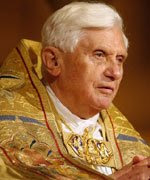 Criticism of Pope Benedict XVI has come from various quarters — Muslims, Jews, members of his own flock.
Criticism of Pope Benedict XVI has come from various quarters — Muslims, Jews, members of his own flock.But in the latest papal controversy, even Germany's leader and some top Roman Catholic churchmen are questioning Vatican policy after Benedict last month rehabilitated a Holocaust denier as bishop along with three other ultraconservative clergymen.
Seeking to spare Benedict direct criticism, many Catholic leaders are blaming unidentified aides. However, the furor gives a rare glimpse behind the Vatican's facade of unity and once again raises questions about the pontiff's commitment to interfaith relations.
German Chancellor Angela Merkel entered the debate on Tuesday, calling on Benedict to issue a "very clear" rejection of Holocaust denial after he rehabilitated Richard Williamson.
The British-born bishop has apologized to the pope for stirring controversy but did not repudiate his statement that historical evidence "is hugely against 6 million Jews having been deliberately gassed" during World War II.
His statement came in an interview with Swedish state television filmed in November but broadcast only three days before Benedict lifted the excommunications of the bishops on Jan. 24 as a major step to end a schism in the Church.
Williamson and the other bishops were consecrated by the late ultraconservative Archbishop Marcel Lefebvre without papal consent. The Holy See said that removing the excommunication did not mean the Vatican shared Williamson's views.
Under pressure to explain himself, Benedict told his weekly audience this past Wednesday that he feels "full and indisputable solidarity" with Jews and warned against any denial of the full horror of the Nazi genocide. But Merkel said she does not believe the pope had gone far enough to reject Holocaust denial.
In unusually frank comments to Vatican Radio's German-language service, Cardinal Walter Kasper said he was following the controversy "with great concern."
Kasper, one of the Vatican's pointmen for relations with Jews, said: "Surely, mistakes have been made in the management of the Curia, too, I want to say this explicitly." The Curia is the body of offices at the Vatican that assist the pope in management of the Church.
Criticism from other prelates in the German-speaking world was also tough.
Hamburg Bishop Werner Thissen assailed Williamson's rehabilitation — he had been excommunicated for having been consecrated without papal consent 20 years ago — as "sloppy work" that had caused great damage to relations with Jews.
Bishop Gebhard Fuerst of Rottenburg-Stuttgart said the rehabilitation of Williamson was seen by many as "a loss of credibility for the Roman Catholic Church." Austrian Cardinal Christoph Schoenborn told Austrian broadcaster ORF that "Vatican staff members didn't look closely enough" at Williamson's views.
The controversy has tested Benedict's strong record against anti-Semitism, which includes visits to the Auschwitz Nazi death camp in Poland and synagogues in Germany and the United States.
The pope had earlier said he had lifted the excommunication because the bishops had "repeatedly shown their deep suffering" over the split.
The first blow up of Benedict's papacy came in 2006 when the pope's remarks on Islam and holy war in a speech in his native Germany angered much of the Muslim world, leading him to backtrack and declare himself "deeply sorry."
"I think this pope consults very little," said Marco Politi, a biographer of Pope John Paul II. "In three years he has succeeded in creating strains with two of the world's leading religions. It raises the question about the governance of the universal church."
+++++++++++++++++++++++++++++++++++++++++++++++++++
Disclaimer
No responsibility or liability shall attach itself to either myself or to the blogspot ‘Clerical Whispers’ for any or all of the articles placed here.
The placing of an article hereupon does not necessarily imply that I agree or accept the contents of the article as being necessarily factual in theology, dogma or otherwise.
Sotto Voce
(Source: RCN)
